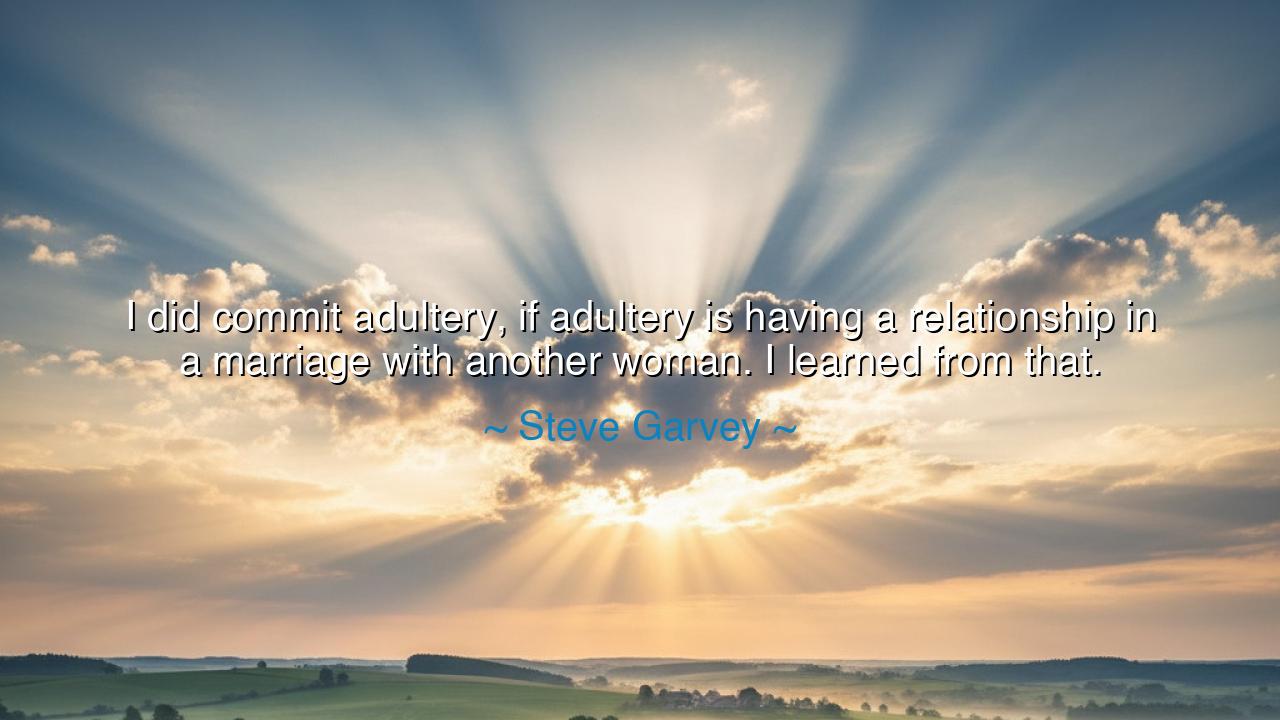
I did commit adultery, if adultery is having a relationship in a
I did commit adultery, if adultery is having a relationship in a marriage with another woman. I learned from that.






O children of wisdom, hear the words of Steve Garvey, a man whose life, like all lives, is fraught with both triumphs and trials: "I did commit adultery, if adultery is having a relationship in a marriage with another woman. I learned from that." These words, though spoken by a man who stands in the public eye, are no mere acknowledgment of a personal failing. They are a testament to the complexity of the human experience—where mistakes are made, but wisdom is gained. Let us reflect upon the meaning of these words, for they offer not just a confession, but a profound insight into the nature of growth, forgiveness, and the deep journey of the human soul.
In the ancient world, when a person spoke of adultery, they were not merely speaking of a breach of marital vows, but of a fracture in the very fabric of society. The laws of many civilizations, from the great cities of Mesopotamia to the flourishing cultures of Greece and Rome, held marriage in the highest regard. To commit adultery was to betray not only one’s partner but also the sacred bonds that held together families, communities, and nations. In those times, such acts were seen as a rupture in the order of the world—a betrayal of the cosmic balance between duty and love.
Yet, as time has passed, the understanding of adultery has shifted. No longer seen as merely a violation of societal norms, adultery has come to symbolize a deeper human struggle—one of desire, temptation, and the imperfections of the soul. The ancient Greeks, with their gods who were as flawed and fallible as any human, understood that love and loyalty were not simple concepts. The great hero Achilles, in his moment of rage, broke his bonds with his fellow Greeks, and in doing so, set in motion the events that would lead to the fall of Troy. His actions, though born of passion, brought ruin, and yet, in the midst of his suffering, Achilles found his humanity. It was through his mistakes that he discovered the true nature of honor and redemption. So too must we understand that adultery, though a serious wrong, is also an opportunity for deep reflection and eventual growth.
Steve Garvey’s words reflect a similar journey—one of acknowledgment and learning. To admit that he had committed adultery is not to dwell in shame, but to recognize the profound consequences of his actions. It is an act of honesty, a willingness to face the truth about himself and the choices he made. In his admission, Garvey does not seek to diminish the significance of his actions, but instead speaks to the truth of the human condition: that we all make choices, some of them painful, that have lasting consequences. Yet, within that admission lies the possibility of growth—the potential for the soul to rise above its mistakes and to learn from them.
Consider the story of King David in the Bible, a man after God’s own heart, yet one who committed the grievous act of adultery with Bathsheba. His sin, when discovered, caused great turmoil within his family and kingdom. Yet David did not hide from the consequences of his actions. He repented deeply, acknowledging his wrongdoing, and sought to rebuild the broken pieces of his life. In his humility, he found redemption, not in perfection, but in the sincere desire to make amends and to learn from his failures. David’s story teaches us that even the greatest among us are not beyond the reach of mistakes, but it is in how we respond to those mistakes that our true character is forged.
The lesson that Steve Garvey imparts, and which we must all carry with us, is the importance of reflection and learning from our choices. Adultery, like all wrongdoing, is a wound—both to the one who commits it and to those who are affected by it. But it is also a lesson. When we are able to look at our actions honestly, without seeking to hide or deny, we open the door to healing. The path to redemption is not through the denial of our flaws, but through the recognition of them and the commitment to change. As the great philosophers taught, it is through self-examination that we find our way to wisdom and growth.
What, then, can we do in our own lives? We must first recognize that perfection is not the goal, but rather, the continual pursuit of growth. When we falter, when we make mistakes—whether in marriage or in any other area of life—we must not allow ourselves to be consumed by shame or guilt. Instead, we must learn from our actions, seek forgiveness where it is needed, and move forward with the intent to do better. It is in our willingness to face our failures honestly that we find the strength to rise above them. Let us not be paralyzed by our mistakes, but empowered by the knowledge that each failure is an opportunity to become a better version of ourselves.
Remember, the journey of the soul is one of continuous learning, and each step—whether it be a misstep or a triumph—brings us closer to the person we are meant to become. Let us, then, walk with humility and honesty, knowing that the path is not always straight, but that in our willingness to learn, we will find our way. The lesson is clear: our mistakes do not define us, but how we respond to them shapes the very essence of our character. May we embrace our flaws, our challenges, and our failures as opportunities for the soul to grow and transform.






AAdministratorAdministrator
Welcome, honored guests. Please leave a comment, we will respond soon